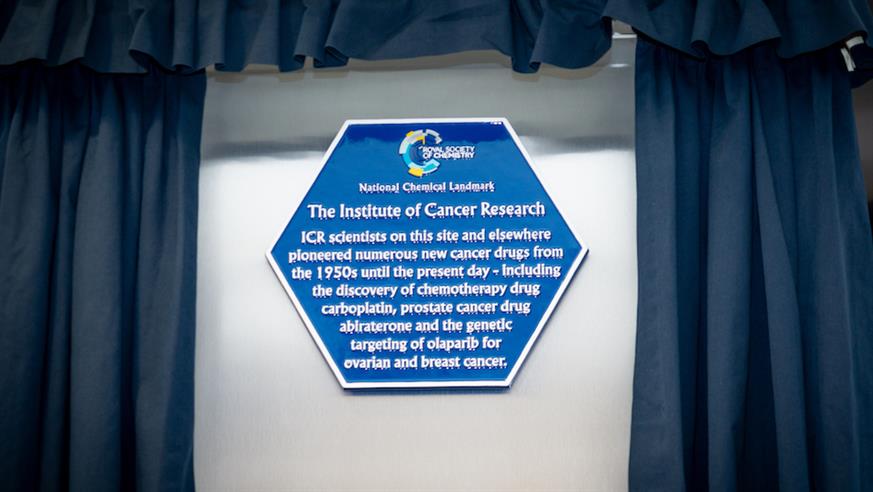
The ICR has been recognised for its many successes in drug discovery through the award of blue plaques in Sutton and Chelsea under the Royal Society of Chemistry’s Chemical Landmark scheme.
Chemical Landmarks are publicly visible distinctive blue plaques – similar to the famous heritage plaques found on many famous buildings – and aim to give an insight into chemistry's relevance to everyday lives.
They recognise sites where the chemical sciences have made a significant contribution to health, wealth, or quality of life.
The award of plaques in both our Chelsea and Sutton sites marks the role the ICR has played in cancer drug discovery from the 1950s until the present day – including the discovery of chemotherapy drug carboplatin, prostate cancer drug abiraterone and the genetic targeting of olaparib for ovarian and breast cancer.
Recognising sites of historical significance
Professor Dominic Tildesley, former President of the Royal Society of Chemistry, attended the unveiling ceremony to mark the award of the plaques.
The prestigious award scheme was initiated In 1999, and the ICR is one of only around 50 chemical landmarks, including four international landmarks.
Previous plaques awarded recognise Dorothy Hodgkin’s Nobel prize-winning work at her labs in Oxford, the discovery of ibuprofen at Boots research laboratories in Nottingham – and there is even a plaque mounted on the John Snow pub on Broadwick Street to mark the epidemiologist’s groundbreaking work to link the spread of a cholera outbreak in 1850s London to a contaminated water pump – pioneering the beginnings of a modern approach to public health.
Thanks to all of those involved
Representatives from the Royal Society of Chemistry's Downland Local Section and the Chilterns and Middlesex Local Section – which cover our sites in Sutton and Chelsea respectively – were also present at the events to celebrate the award with staff and students from across the ICR.
Also present was Dr Beverley Weston, the widow of Professor Ken Harrap, who led the Centre for Cancer Therapeutics at the ICR until his retirement in 1997.
Beverley herself worked at the ICR from 1966-1974, and she initiated the application process for this award, together with the Downland Section of the Royal Society of Chemistry, for recognition of the ICR's drug discovery work. The ICR would like to thank Beverley and both the Downland and Chilterns and Middlesex sections for their support in sponsoring this award.
A history of drug discovery at the ICR
Following the unveiling ceremony, attendees heard a short lecture – delivered by ICR Chief Executive Professor Paul Workman in Chelsea and in Sutton, and by Professor Ian Collins, Head of Chemistry in the Cancer Therapeutics Unit – giving an overview of the ICR’s history of drug discovery.
The talks covered the ICR’s role in the early chemotherapies and in the modern era of targeted drugs and immunotherapies.
Since 2005 the ICR has discovered 20 new targeted cancer drugs and taken 10 into clinical trials. Drug discovery and development led by the ICR has transformed treatment for patients worldwide.
Professor Paul Workman, Chief Executive of the ICR said:
"The award of Chemical Landmarks plaques from the Royal Society of Chemistry is a great recognition of the impact that ICR scientists, past and present, have made in drug discovery, to transform the lives of many patients with cancer.
“The close integration of chemistry and biology, and in turn the integration with medicine, has always been a key feature of ICR’s success – from the early days of isolating chemical carcinogens and the demonstration of how they cause cancer by damaging and causing mutations in DNA, through to the discovery of many important cancer drugs.
“Our success in drug discovery is a story of successful partnership – with the Royal Marsden with whom we’ve progressed our drugs into clinical trials, and with many academic and industry partners. We also owe our success to funding from Cancer Research UK, Breast Cancer Now, Wellcome Trust and others. I’m very grateful to them and to all our staff across the whole of ICR, and also our many supporters, and importantly patients who have taken part in trials with our drugs, together with their families and friends.
“Successful drug discovery requires Team Science and it’s the work of a great , extended team, over many years, that has underpinned this chemical landmark award – of which I’m very proud.
"Being able to display these distinctive blue plaques on our sites in Chelsea and Sutton will be a wonderful way to raise the profile of our work across our local communities – and I hope will engage a new audience in the important work we do.”
Professor Dominic Tildesley, former President of the Royal Society of Chemistry said:
“Almost everyone has some experience with cancer – through their family, friends or themselves. It’s a word no-one wants to hear, but it’s vital to talk about it. Fortunately, part of the reason we’re here today is that advances in science, medicine and society mean that more people are surviving more cancers than at any other time in history.
“Today’s landmark, of course, celebrates just not this location, but a network of several places all working together for a common purpose. This, I think, reflects beautifully the global chemistry community – collaborating across disciplines, and across borders, to improve the lives of people around the world, now and in the future.”